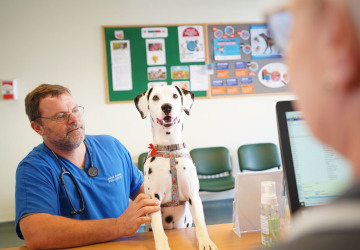
Dog owners should take action now to prepare their pet for ‘Fireworks’ season
October 21, 2021
Fireworks are now a common feature at birthdays and weddings, as well as a key part of many seasonal celebrations like Bonfire Night. Add that to the fact that an estimated 3.2 million households got a pet during lockdown, and the coming weeks could be problematic. As November approaches, there will be many pet owners in Purleigh and across the Purleigh, Maldon, and Burnham-on-Crouch areas, who will be soon dealing with dogs scared by loud noises for the first time this year.
One of the quickest and easiest ways to help most stressed dogs (and other pets) is to think about using pheromone sprays and diffusers.
However, as the ‘Firework Season’ approaches, responsible dog owners should, at the very least, be creating a ‘den’ (a safe place) for their dog with familiar smelling blankets and toys (adding your own unwashed clothing can be comforting). Making sure all windows and doors are shut when it gets noisy outside is a good idea too.
That said, if you’re looking for a long-term solution to help your dog deal with sudden noises like fireworks, it might be worth looking at desensitisation training for dogs. Here’s a quick guide to how that works.
Before you start, you will need these four things…
- A quiet space – You’ll need to introduce your dog to this calm place a few weeks before you begin the training.
- Example noises – Audio recordings of fireworks and other loud noises. You can get these in many places online.
- Treats – A selection of your pet’s favourite treats and toys.
- Time – This process takes two or three half hour (approx.) sessions over several weeks.
And this is the five-step process you should follow…
- Play the noise quietly – In their calm place, play the noises you are using at a low level so that your pet either doesn’t respond at all, or just turns towards the source. Do this for periods of up to 30 seconds.
- Reward good behaviour – After each reaction, give them a tiny piece of their favourite food, about the size of a pea.
- Slowly increase the noise – Once they stop reacting to the loud sounds and do other things while the sounds are playing, slowly (session by session) increase the volume. With each increase in volume give your dog up to 30 seconds to get used to the new level and continue to offer the treats after each noise.
- Vary the volume – After two or three sessions (assuming your dog is reacting well), start to vary the volume. There should be a general increasing trend, but make the volume lower as well as higher, as this will give you a longer lasting and generally more effective response.
- Take your time – Take it easy and don’t rush the process. Like all of the most effective training, it takes time and regular practice to get the response you want to loud noises. Repeating the training every now and then will help too.
So, there you have it, some excellent advice for dog owners new and old, to get your pets used to sudden loud noises and condition them to deal with ‘Bangs’ over time. As ever, if you need any help, you can always contact our Chelmsford Road practice on 01621 828381 to discuss your dog’s particular needs.






